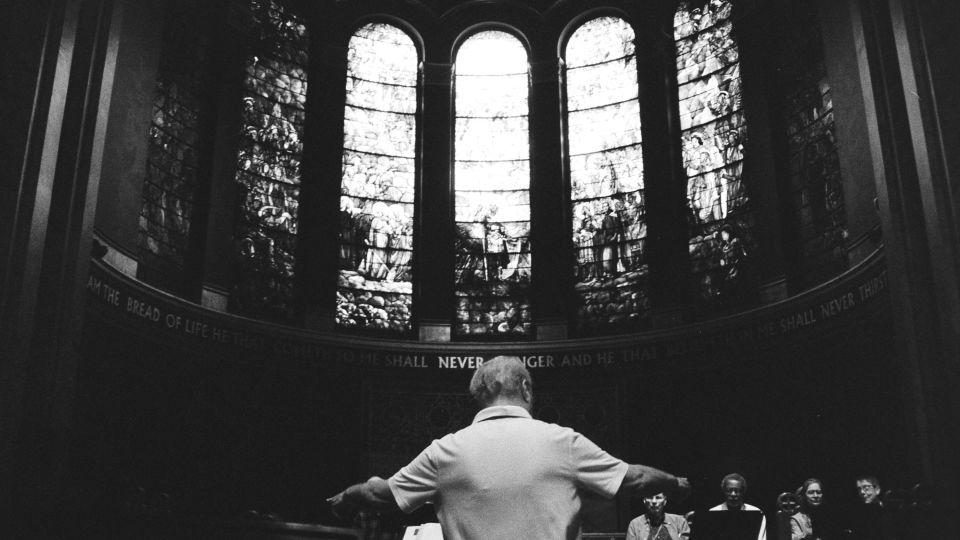The Unforgettables Chorus provides a unique and supportive environment for people suffering from dementia and Alzheimer’s disease, along with their caregivers. Founded in 2011 by Dr. Mary Mittelman at NYU Langone Health, this wonderful initiative seeks to foster connection and joy through the power of music. Each week, members gather at St. Michael’s Church on New York’s Upper West Side, creating a harmonious space that resonates with laughter, emotion, and the vibrant energy of song.
Upon entering the atmospheric church, with its soft light filtering through stained glass and towering organ pipes, one can sense the anticipation in the air. Choir members—many of whom are older adults accompanied by younger caregivers—arrive in pairs, collecting their name tags before settling into their seats. The music director, Tania Papayannopoulou, ensures everyone feels welcomed and ready by distributing songbooks. With smiling faces and joyful hearts, the group begins with “Unforgettable,” a classic tune that sets the stage for their musical journey.
This chorus isn’t merely about singing; it’s a community endeavor aimed at enriching the lives of its members. The focus is on participation, joy, and music that stirs long-held memories. Research indicates that while dementia impairs many cognitive functions, musical memories remain intact longer than other memories. This finding is underscored by Dr. Borna Bonakdarpour, a neurologist who notes that music stimulates emotional and social connections, even in the later stages of Alzheimer’s. The melodies and lyrics can evoke powerful emotions, allowing participants to reconnect with their identities and loved ones.
The emotional impact of music is profoundly evident in the lives of chorus members and their families. Take Bridget Elias and her husband Townsend Davis, for instance. After 22 years of marriage, Davis faced a life-altering revelation when Elias was diagnosed with early-onset Alzheimer’s in 2016. In response to their challenges, the couple sought solace in travel and supportive communities like the Unforgettables Chorus. Davis has adapted to their changing dynamics, keeping music at the forefront of their lives through personalized playlists that bring Elias joy. Together, they navigate the spectrum of emotions Alzheimer’s presents, often finding comfort and connection in song.
Another poignant story is found in the life of David Damstra, an 87-year-old chorus member and former opera singer. His music has served as an unbreakable thread linking him to his past. Since joining the chorus seven years ago, he has found empowerment and joy, even as he grapples with Alzheimer’s. His wife, Evelyn, emphasizes the importance of music in maintaining normalcy in their daily lives. Singing and listening to the radio have become fixed parts of their partnership, allowing spontaneity and love to thrive amid the challenges.
For families like Helen Ying and her daughter Linda Tang, music emerges as a therapeutic tool for fostering connection. Though Ying has not been formally diagnosed with Alzheimer’s, she experiences mild cognitive impairment. Linda’s keen awareness of her mother’s emotional state has led them to seek programs that leverage music to promote calm and receptivity. Their engagement in the “With Music in Mind” initiative has offered opportunities for bonding, cultural engagement, and mutual support.
Through shared experiences, members such as Judy Thoms and Eric Coleman find solace and kinship in the chorus. Both have encountered loss—Thoms through her husband and Coleman through his friend, Lola. The chorus becomes a refuge where they can create new memories while honoring the past. Coleman reflects on the transformative role music plays in maintaining human connections, asserting that it provides an avenue to navigate the complex emotions surrounding loss and Alzheimer’s.
Finally, Boyd Lowry’s story underscores the deeper meaning of music in his life. Over several decades, this lifelong singer has experienced the joys of familial harmony alongside the burdens of Alzheimer’s. Mary, his wife, keeps their shared love of music alive, creating moments of connection where Boyd lights up through song. Together, they navigate the challenges of cognitive decline and demonstrate how music can inspire joy and love even in the face of adversity.
In conclusion, stories from these musical families vividly illustrate how the Unforgettables Chorus fosters an environment rich in support, connection, and joy. Music acts as both an emotional anchor and a bridge, building connections that help participants reclaim parts of themselves lost to memory. Through these harmonious gatherings, individuals and their caregivers can share laughter, tears, and, most importantly, the unbreakable bonds of love and memory that music beautifully encapsulates.












